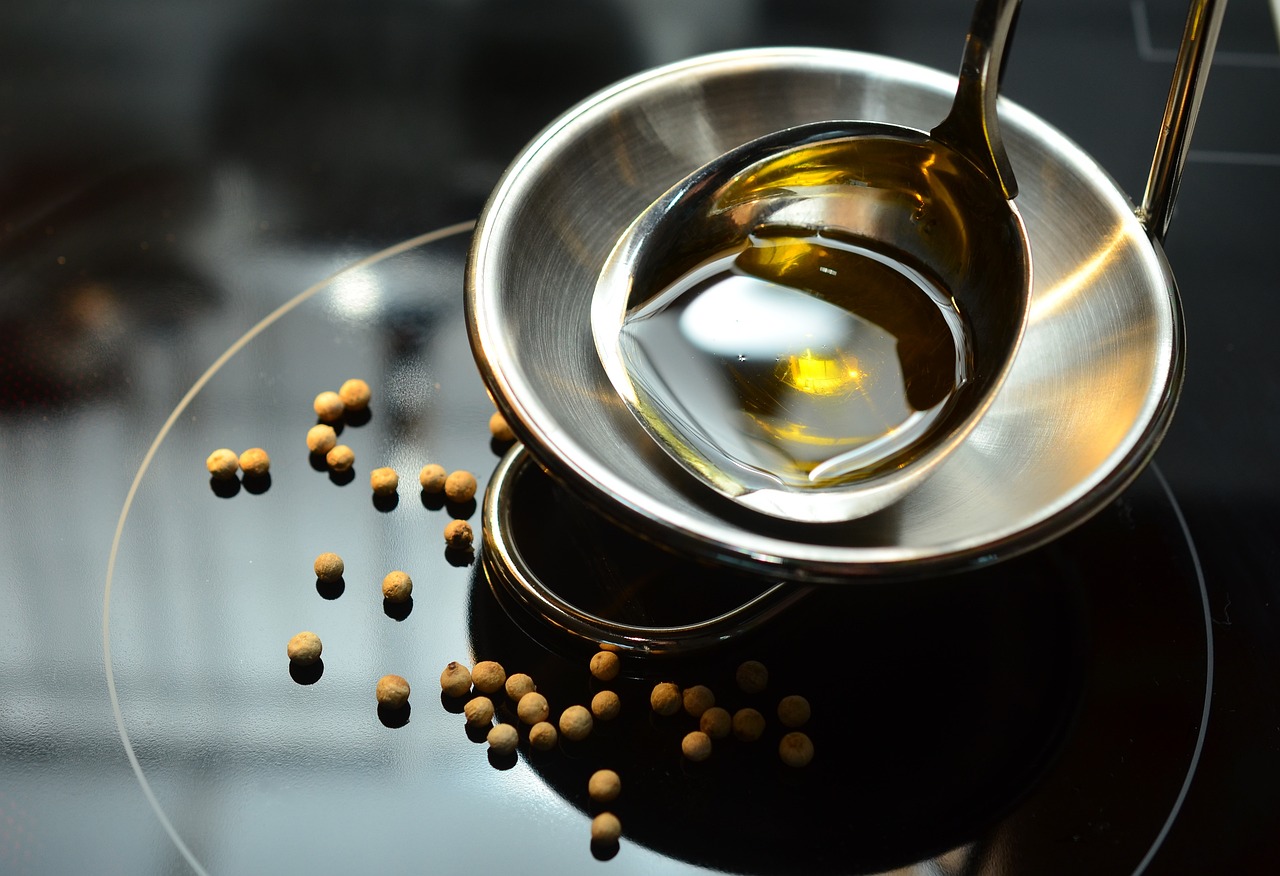Not all cooking oils are the same!
Find out about oils that are beneficial to your health and those that are not good for you. Pick an appropriate oil for each cooking procedure and create meals with excellent flavour and nutrition each time.
What Are The Different Types of Cooking Oil and How To Use Them?
The kind of cooking oil used is determined by its ingredients. The majority of cooking oils are derived from grains or seeds, yet a few come from animal sources instead. There’s no one source of cooking oil but many. Using different oils when cooking can add variety to your meals, as well as aiding your efforts to improve your physical wellbeing.
OLIVE OIL & EXTRA VIRGIN OLIVE OIL
Oil is obtained from olives by pressing them and gathering the liquid that comes from them. It is a significant component of the Mediterranean diet. The United States annually utilizes an estimated 406,000 metric tons of olive oil, ranking it as the third chief user in the world.
Olive oil as well as extra virgin olive oil burn more easily than other oils, therefore they work better for cooking over medium heat. Olive oil is not able to be exposed to severe heat before it begins to smoke and ignite. Cooking with high temperatures, a better option may be to use a refined or pure olive oil.
Extra virgin olive oil has a better taste than regular olive oil and is thus ideal for sautéing, for dipping, for making salads dressings or for creating marinades.
Olive oil is packed with beneficial monounsaturated fats and oleic acid, which can help reduce the risk of heart disease and bring down cholesterol levels. It’s also low in polyunsaturated fat.
Extra virgin olive oil is the least processed variety of olive oil, therefore, it retains more of its natural nutrients and antioxidants. A review in the 2018 International Journal of Molecular Sciences states that antioxidants curb oxidative harm which may result in inflammation and conditions like cancer or diabetes.
CANOLA OIL
This neutral-flavored oil comes from a plant called rapeseed. This type of cooking oil is reliable, inexpensive, and can be employed for a multitude of culinary tasks such as baking, grilling, stir-frying, and preparing salad dressings.
Canola oil is high in monounsaturated fat and offers a substantial amount of polyunsaturated fat. This cooking oil has the least quantity of saturated fat and it likewise has a superior plant-based source of the useful omega-3 unsaturated fats.
Canola oil has some heart health benefits. An assessment of research put forth in Nutrition, Metabolism & Cardiovascular Diseases Reviews disclosed that canola oil can noticeably decrease people’s odds of developing heart disease.
COCONUT OIL
Coconut oil is a solid at normal temperature similar to butter or lard, not like the liquid kind of oil. It comes from the fruit of the coconut palm tree. Unprocessed coconut oil is suitable for cooking at moderate temperatures and for baking, whereas refined coconut oil can withstand higher heat.
A 2021 review published in the Journal of the Science of Food and Agriculture concluded that coconut oil can help mitigate the threats of cancer, diabetes, and cardiovascular disease, as well as enhancing the health of the skin. It asserts that scientists in the West need to conduct more investigations into the advantages of coconut oil.
READ MORE: Coconut Oil Health Benefits
Coconut oil is good for the skin because it nourishes the cells and protects them from dangerous UV rays. It is also a good moisturizer for hair. Not only has it become a culinary phenomenon, but a cosmetic one as well.
GRAPESEED OIL
This useful cooking oil can be taken from leftover grape seeds which are the result of producing wine. Gaining favor with chefs and foodies, grapeseed oil offers a subtle flavor that easily combines with other stronger tastes. This oil is suitable for a variety of uses including sautéing, roasting, or being used as part of a salad dressing. The Cleveland Clinic suggests that you put the item in the fridge with walnut oil to avoid it becoming spoiled.
Grapeseed oil is packed full of vitamin E, a substance that possesses significant antioxidant properties. There is a large quantity of omega-6 polyunsaturated fat in it.
Research published in Missouri Medicine journal suggests that omega-6 fats may lead to obesity, autoimmune diseases, asthma, and allergies, yet a different paper appearing in Food & Function found that omega-6 fats found in rapeseed oil are likely to decrease inflammation. We need to do additional investigations to find out how grape seed oil can influence our well-being.
SESAME OIL
Oil that is derived from sesame seeds is popular in dishes from Asian, Indian, and Middle Eastern cuisine. The flavor of any meal can be enriched by sesame oil, particularly when opting for the nuttier taste of the darker toasted sesame oil, which is known for having a sharper taste. Refrigerate sesame oil after opening it.
Sesame oil has sesamol, a significant natural phenol that possesses both antioxidant and anti-inflammatory capabilities.
SUNFLOWER OIL
Sunflower oil tends to be light in hue and not possess any specific taste, and has got one of the greatest proportions of polyunsaturated fat compared to other cooking oils. This product does not just have some monounsaturated fats, it also contains a reduced amount of saturated fat, which makes it an excellent option for those looking to maintain a healthy heart. Sunflower oil is ideal for any type of cooking due to its ability to maintain high temperatures, making it suitable for roasting, frying, and deep-frying.
There are three types of sunflower oil available in the U.S. for home cooking, each of which have been modified to have different fatty acid profiles:
- High linoleic acid
- Mid-oleic
- High oleic
Altering sunflower oils to contain a higher concentration of either linoleic or oleic acid influences how they conduct when cooked. All three varieties of fat possess the same quantity of saturated fat, however, high oleic contains a greater amount of monounsaturated fat and high linoleic contains more polyunsaturated fat.
Eating lots of foods with oleic acid has been associated with reduced cholesterol levels and a reduced possibility of coronary heart disease. It may also increase good cholesterol.
VEGETABLE OIL
Traditionally, veggie oil has been derived from soybeans. Nowadays, the expression “vegetable oil” can refer to a mix of multiple oils. Soybean-based vegetable oil is a tasteless oil with little flavor, but it is a useful, multipurpose cooking oil that can be used to fry, sauté, and make salad dressings.
Soybean oil is mainly made up of polyunsaturated fat, with only 15% being saturated fat. Soybean oil has the added benefit of containing beneficial omega-3 fats, which are beneficial for cardiac health, these fats are usually found in fish like salmon and sardines, however they are less commonly present in other vegetable sources.
Using Butter as Cooking Oil
Butter is thought to have the most delectable flavor of the various oil choices accessible these days. There is a lot of disagreement, however, concerning how beneficial it is.
In our household, butter is employed fairly often when we are in the kitchen. It serves as an excellent foundation for different white sauces, and it melts and crisps up nicely. However, browning is something that you may not want.
The browning that takes place during the making of butter is a result of the milk solids in butter cooking and shifting in hue. This could be aesthetically pleasing, but it could also be less than satisfactory. The caramelization of the butter creates a lot of flavor, yet this is also the source of the butter’s low smoke point. The smoke point is the temperature at which smoke is continuously given off when the fat or oil is heated.
The smoke point is important because it can determine the highest temperature you can cook your food at. As an example, deep-frying in butter is not suggested due to its low smoke point of 150?C, which is too low of a temperature to deep-fry anything. If you don’t mind the smoke point of butter, you may be drawn to it for multiple reasons.
Principally, the reason people like butter is the flavor. The delicate flavor of nuts is not easily obtained from other sources, and many people have a great appreciation for it. Secondly, butter actually has a number of health benefits.
Although it has a high level of fat, butter can be beneficial because it contains a variety of nutrients, so it should only be consumed in small amounts. As an illustration, the butyrate in butter could be beneficial to people’s immune systems. In addition, research has uncovered that fat-rich dairy items such as butter may actually be associated with a lower probability of weight gain, diabetes, and cardiovascular diseases. It is essential to consume this food in a reasonable amount if this statement is to remain accurate.
What’s The Healthiest Cooking Oil?
Well, ‘healthiest’ is a big word. Various oils have different benefits. Most of the time, the two most popular oils are coconut oil and extra virgin olive oil.
Coconut oil has become increasingly favored in recent times, making it worthwhile! For centuries, this food has been consumed by some of the most thriving societies on the planet, so we can be sure it is reliable – and this is a fantastic reason to add it to your meal plan!
Coconut oil has a high concentration of essential fatty acids, especially medium-chain triglycerides. Research has confirmed that several positive changes in metabolic rate and body weight occur when consuming fatty acids.
Using coconut oil is very convenient. This substance is solid at room temperature, making it convenient to save in the kitchen. Additionally, it retains its properties at high heat levels, meaning it is suitable for foods that need to be cooked at a high temperature, for example stir-frying. It also adds a wonderful taste!
Olive oil has been widely recognized as the primary choice for cooking. We enjoy it for its delicious flavor and affordability – often, a liter bottle can cost us no more than $10. That said, it is also particularly healthy.
Olive oil is composed mainly of monounsaturated fatty acids. Olive oil contains a large quantity of omega-3 fatty acids and has been linked to better brain health for a long time, which is one reason why the Mediterranean diet is so beneficial.
It is ideal for medium temperature cooking, however coconut or avocado oil should be used if the temperature is very high. We haven’t encountered any issues when we use olive oil in regard to its smoking point.
Lesser-Known Types of Cooking Oil
At this time, various oils are gaining popularity, but the most popular ones are peanut oil and avocado oil.
Peanut oil is particularly long established in eastern cuisine because of its heat tolerance. Its smoke point is highly elevated. Typical Asian cuisine usually involves the use of a large, wide pan with a lot of heat. Peanut oil is perfect for coating the bottom of the skillet since it won’t start to burn and it brings an amazing taste as well.
Peanut oil has an intense nutty flavor which makes it a great choice for many Asian recipes. This oil’s richness and subtle sweetness complement the strong, spicy, and tangy flavors found in traditional Asian dishes.
Avocadoes have become increasingly fashionable in recent years, and the same can be said for avocado oil. In comparison to other oils, its smoke point is far higher, thus making it ideal for cooking in high temperatures.
As well as that classic benefit, it’s particularly versatile. Studies have determined that it is not only helpful in the kitchen, but can help to facilitate the body’s uptake of vital nutrients when added to salads. This means that overall it’s a particularly healthy pick. Avocado oil has a remarkable positive effect on cholesterol, which is always a great thing.
A significant downside to avocado oil is that it is quite costly – consequently, it is not sensible to purchase it and use it on a regular basis in the household. Although not strong, the taste of it is quite pleasant.
READ MORE: What Is Flaxseed Oil Used For?









